Cite this document
(“Fetal Alcohol Syndrome Research Paper Example | Topics and Well Written Essays - 1750 words”, n.d.)
Fetal Alcohol Syndrome Research Paper Example | Topics and Well Written Essays - 1750 words. Retrieved from https://studentshare.org/medical-science/1745703-fetal-alcohol-syndrome
Fetal Alcohol Syndrome Research Paper Example | Topics and Well Written Essays - 1750 words. Retrieved from https://studentshare.org/medical-science/1745703-fetal-alcohol-syndrome
(Fetal Alcohol Syndrome Research Paper Example | Topics and Well Written Essays - 1750 Words)
Fetal Alcohol Syndrome Research Paper Example | Topics and Well Written Essays - 1750 Words. https://studentshare.org/medical-science/1745703-fetal-alcohol-syndrome.
Fetal Alcohol Syndrome Research Paper Example | Topics and Well Written Essays - 1750 Words. https://studentshare.org/medical-science/1745703-fetal-alcohol-syndrome.
“Fetal Alcohol Syndrome Research Paper Example | Topics and Well Written Essays - 1750 Words”, n.d. https://studentshare.org/medical-science/1745703-fetal-alcohol-syndrome.


